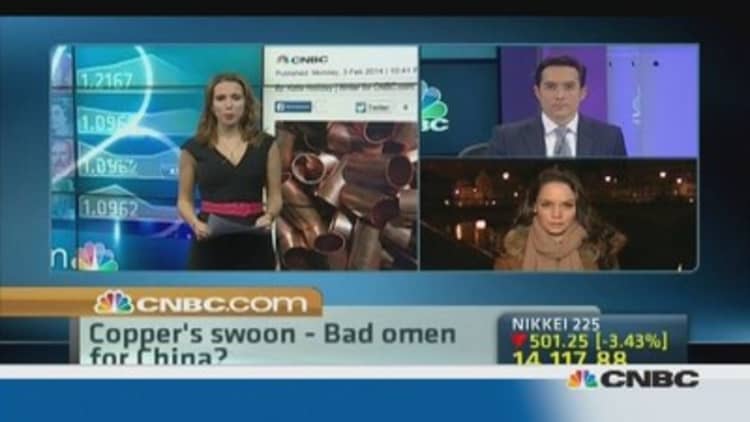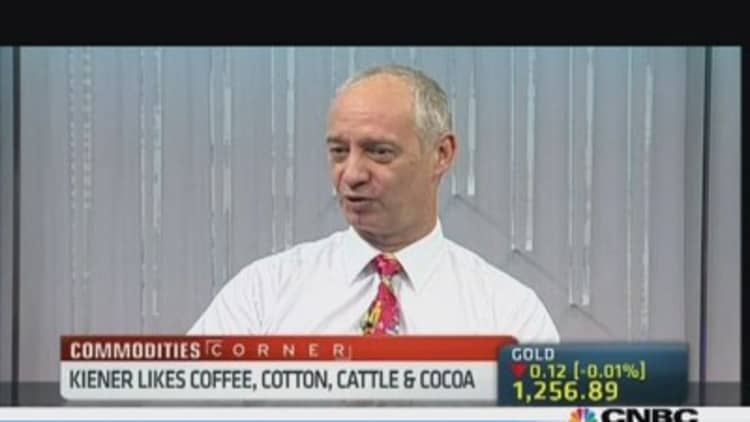
marked their longest losing streak in 18 years this week, but while some say the slump is a bad sign for the metal's biggest importer China, others say it's no cause for alarm.
The industrial metal's price, widely perceived as a bellwether for global market sentiment and often referred to as 'Dr. Copper,' fell to $3.184 per pound or $7,020 per ton Monday, its ninth consecutive decline, as softer manufacturing data out of China and the U.S. led investors to ditch the commodity amid supply concerns.
(Read More: Can China's weak PMI be blamed on Chinese New Year?)
The rout in copper prices came alongside a broader selloff across global equity markets in recent weeks triggered by a combination of emerging market jitters and tapering concerns.
"This is reflective of the rumblings in China, it's been a long time coming," Andrew Su, chief executive officer at Compass Global Markets told CNBC, referring to a decline in the price of copper.
"I expect China's gross domestic product (GDP) [growth] to slow significantly this year, and people are starting to price that in. I see copper falling to $6,000 per ton or $3 per pound within the next quarter," he added, referring to a 14.5 percent decline on Tuesday's levels.
Copper prices have been correcting since hitting a high of $10,000 per ton in early 2011, as concerns over slowing growth in China, which accounts for 40 percent of demand, increased, while an expected production surplus has also been a factor impacting prices.
(Read More: Copper's rout will resume, bounce will be short-lived: analysts)
"We are one of the more bearish forecasters and see China GDP slipping to 7.1 percent this year," said Compass's Su, who expects a correction in China's property market to trigger a broader crash in the economy.
"This will precipitate a vicious circle where overseas lenders to China will suddenly realize the quantum of their exposure to the property market, start to try to hedge their exposures and eventually led to a credit crunch," he added.
(Read More: Stopping copper theft becomes big-time business)
Other analysts were less convinced that the recent declines in copper prices were signalling a major stalling of growth.

"The Northern Hemisphere winter has been much colder than normal, and combined with an earlier than usual Chinese New Year, almost certainly has had an impact on growth perceptions and market sentiment," said Mike Harrowell, senior resources analyst at BBY Limited.
In the U.S., meteorologists are forecasting the winter to be the worst the country has seen in 100 years. Weaker U.S. PMI data published on Monday was blamed on the poor weather, as were weaker than expected auto sales.
(Read More: Markets fear US chilled by more than weather)
Ric Spooner, chief market analyst at CMC Markets' Sydney office, told CNBC Dr. Copper was telling investors that demand growth was set for a period of moderation rather than a disastrous decline.
"The recent decline in copper reflects some winding back of expectations for China's growth against a background of expectations for an increase in mine production capacity," said Spooner.
But Spooner added that the recent declines have perhaps been too severe given the impact of cold weather on U.S. manufacturing activity in January.
"More likely it was a typical market situation where this news event assisted ongoing momentum in markets that were already in the process of a valuation adjustment...Further price weakness could still occur without really ringing alarm bells on China's demand at this stage," he added.
(Read More: A hard landing in China: The risks in one graphic)
He said it was important to remember that copper had a volatile year last year when it traded between $2.98 and $3.79 per pound, and current levels remained within that range.
In early morning trade in Asia, copper had rebounded slightly to trade at $7,021 per ton.
—By CNBC's Katie Holliday. Follow her on Twitter @hollidaykatie


